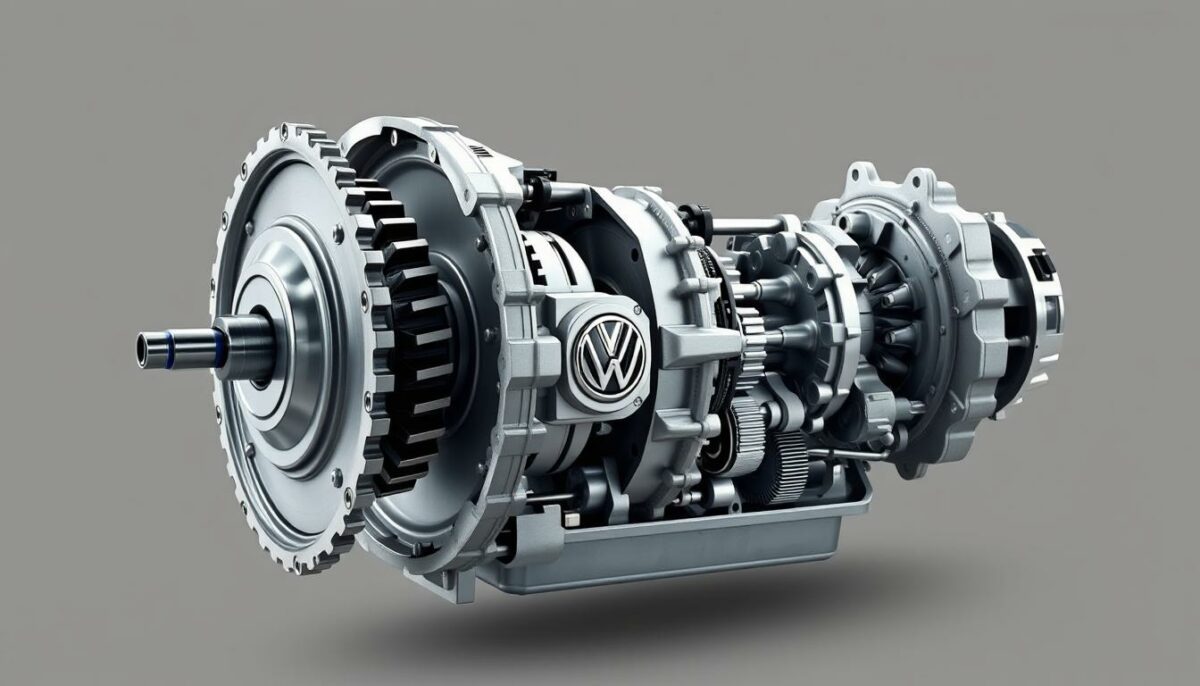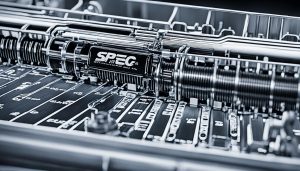Your Volkswagen’s transmission system is crucial for optimal performance. It’s essential to understand how manual, automatic, and Direct Shift Gearbox (DSG) systems function. This knowledge can help prevent expensive repairs in the future.
Warning signs of transmission problems include unusual noises, delayed engagement, and fluid leaks. Early detection of these symptoms allows for timely intervention. This can prevent minor issues from becoming major mechanical failures.
Overview of Volkswagen Transmission Systems
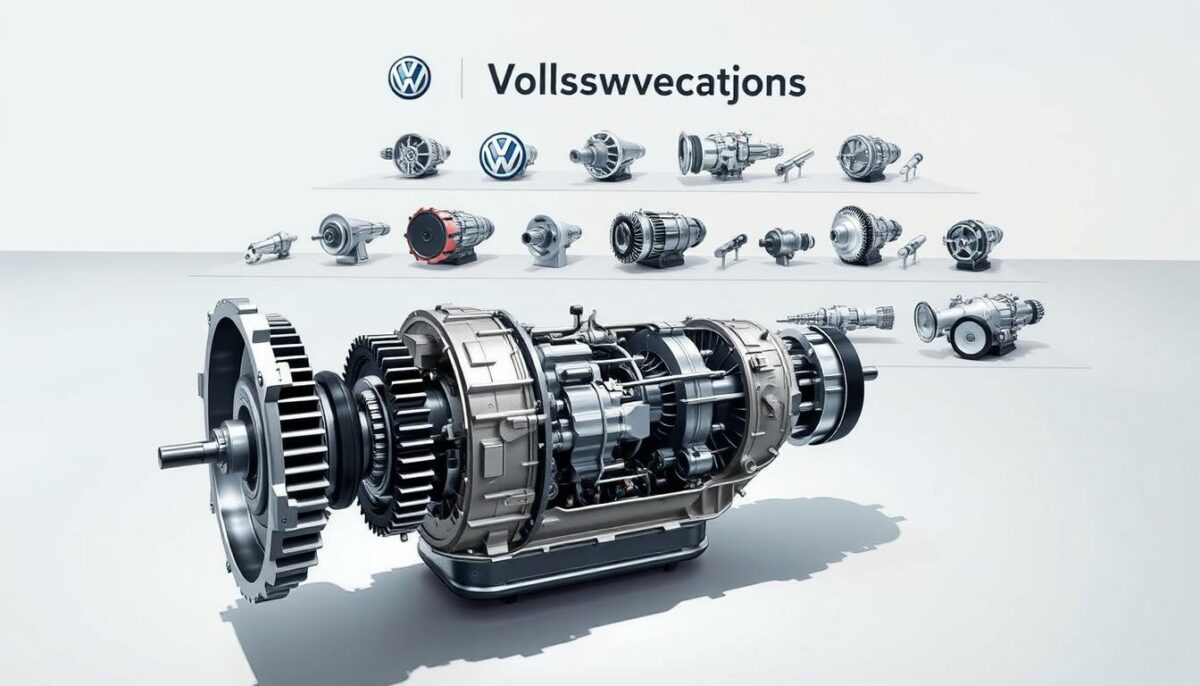
Volkswagen offers manual, automatic, and Direct Shift Gearbox (DSG) transmissions. Each type has unique advantages and potential issues. They differ in operation, driving experience, and maintenance needs. Understanding these can help VW owners maintain their vehicles better.
The transmission links your engine to the wheels, controlling power delivery. VW has refined their technology across models and years. This has led to more efficient and responsive driving experiences. Each system requires specific maintenance considerations.
Differences between manual, automatic, and DSG transmissions
Manual transmissions give drivers full control over gear selection. They use a shifter and clutch pedal. Synchronizers allow smooth transitions between gears. The clutch system disconnects the engine from the transmission during shifts.
Many VW owners like manuals for their direct feel. They’re often more fuel-efficient than traditional automatics. Repairs are generally less expensive. However, problems can include worn clutches and difficult shifting.
Automatic transmissions use a torque converter instead of a clutch. They contain planetary gear sets for different ratios. The hydraulic system shifts gears based on speed and throttle position.
Automatics are convenient in stop-and-go traffic. They’re easier to drive, especially for beginners. However, their complex components often result in higher repair costs. Common issues include fluid leaks and torque converter problems.
The Direct Shift Gearbox (DSG) is Volkswagen’s innovative dual-clutch system. It combines two manual transmissions operated by sophisticated electronics. One clutch controls odd gears, the other even gears.
DSG transmissions offer manual efficiency with automatic convenience. They provide quick gear changes, enhancing performance and fuel economy. However, they require specialized maintenance, including regular fluid and filter changes.
| Feature | Manual Transmission | Automatic Transmission | DSG Transmission |
|---|---|---|---|
| Driver Involvement | High (clutch and shifter) | Low (select drive and go) | Medium (paddle shifters optional) |
| Shifting Speed | Depends on driver skill | Moderate | Very fast (milliseconds) |
| Fuel Efficiency | Typically highest | Typically lowest | Close to manual efficiency |
| Maintenance Costs | Generally lowest | Moderate | Typically highest |
| Common Issues | Clutch wear, hard shifting | Fluid leaks, torque converter failure | Mechatronic unit failure, clutch pack wear |
VW’s transmission technology has evolved significantly. Early models had simple manual transmissions with four or five speeds. Later, VW introduced six-speed manuals with improved synchronizers and smoother shifting.
Automatic transmissions progressed from basic four-speed units to advanced eight and nine-speed transmissions. Modern automatics offer better fuel economy and smoother operation. The DSG’s introduction in 2003 marked a significant milestone.
Knowing your Volkswagen’s transmission type is crucial for proper maintenance. Each system has different service needs. Regular attention can prevent common issues and extend your transmission’s life.
Common Transmission Problems in Volkswagen Vehicles
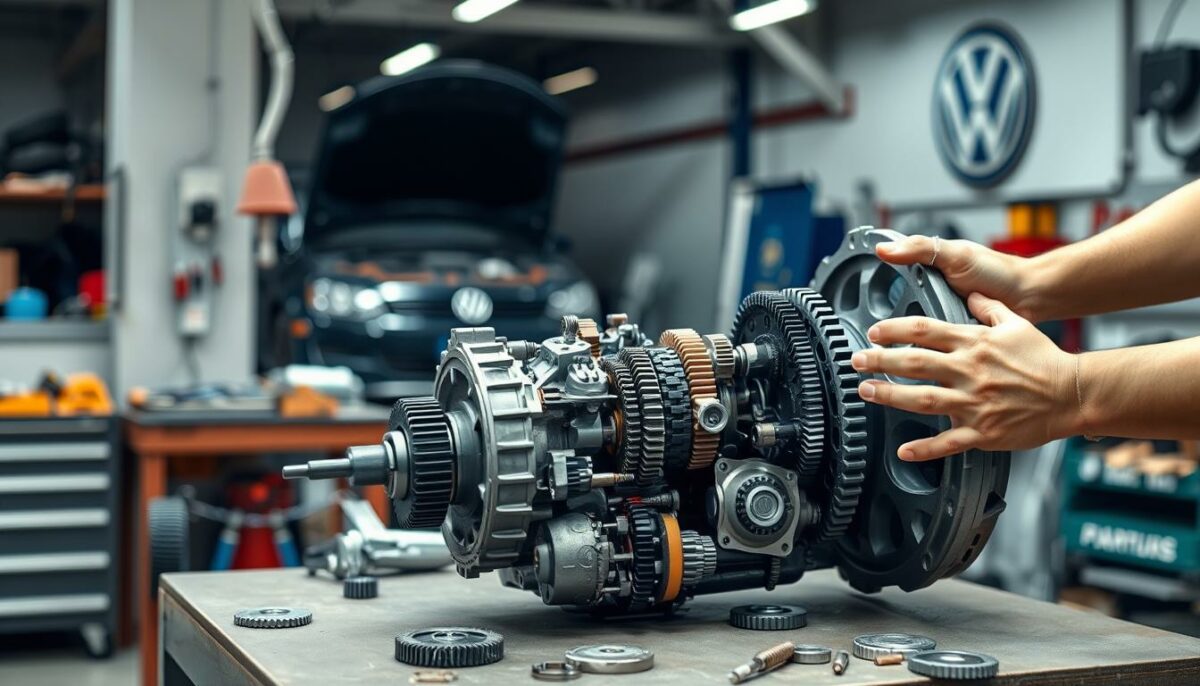
Identifying common transmission issues in Volkswagen vehicles can prevent costly repairs. Volkswagen’s complex transmissions may develop specific problems over time. Early detection of these issues can save owners thousands in repair expenses.
Timely intervention is crucial for maintaining your Volkswagen’s transmission health. Let’s explore the most frequent transmission problems and their early warning signs.
Delayed Shifting or Slipping Gears
Volkswagen owners often report delayed shifting or slipping gears. This issue appears as a lag between accelerating and the car’s response. The transmission may also seem to search for the correct gear.
In DSG and automatic transmissions, worn clutch plates often cause this problem. Low transmission fluid can also contribute by reducing necessary hydraulic pressure. Valve body issues are another common culprit, especially in models with DSG transmissions.
Hard Shifting in Manual Transmissions
Manual Volkswagens may develop hard shifting problems, making gear changes difficult or noisy. This issue feels like resistance when moving the shifter. Grinding sounds often accompany gear changes.
Worn synchronizers primarily cause hard shifting. These components match gear speeds before engagement. Clutch problems can also lead to difficult shifting, as can linkage issues.
Transmission Fluid Leaks
Fluid leaks pose a serious threat to Volkswagen transmission health. Even small leaks can lead to catastrophic failure if ignored. Common leak points include the pan gasket and input/output shaft seals.
Cooler lines may develop leaks at connection points or from corrosion. These often appear as red or brown spots on your parking area. DSG transmissions require precise fluid levels for proper operation.
Transmission Overheating
Overheating risks damaging Volkswagen transmissions, especially in DSG and automatic models. Excessive heat accelerates component wear and breaks down transmission fluid faster. Several factors can cause overheating, including towing beyond manufacturer specifications.
Stop-and-go traffic creates conditions where transmissions work harder with less cooling. Cooling system failures prevent proper heat dissipation from the transmission fluid. Warning signs include burning smells, unusual behavior, and dashboard warning lights.
| Symptom | Potential Causes | Affected Transmission Types | Severity Level |
|---|---|---|---|
| Delayed shifting | Low fluid, worn clutch plates, valve body issues | DSG, Automatic | Moderate to High |
| Hard shifting | Worn synchronizers, clutch problems, linkage issues | Manual | Moderate |
| Fluid leaks | Pan gasket, seals, cooler lines | All types | High |
| Overheating | Towing, traffic, cooling system failure | DSG, Automatic | Very High |
| Grinding noise | Low fluid, damaged gears, bearing failure | All types | Very High |
Some Volkswagen models are more prone to specific transmission issues. Golf and Jetta models (2009-2013) with DSG transmissions often experience mechatronic unit failures. Older Passat models with traditional automatics frequently develop valve body problems after 80,000-100,000 miles.
Early recognition and professional diagnosis of these problems can prevent extensive damage. Many transmission issues, if addressed promptly, can be fixed before requiring complete replacement.
Causes of Transmission Issues
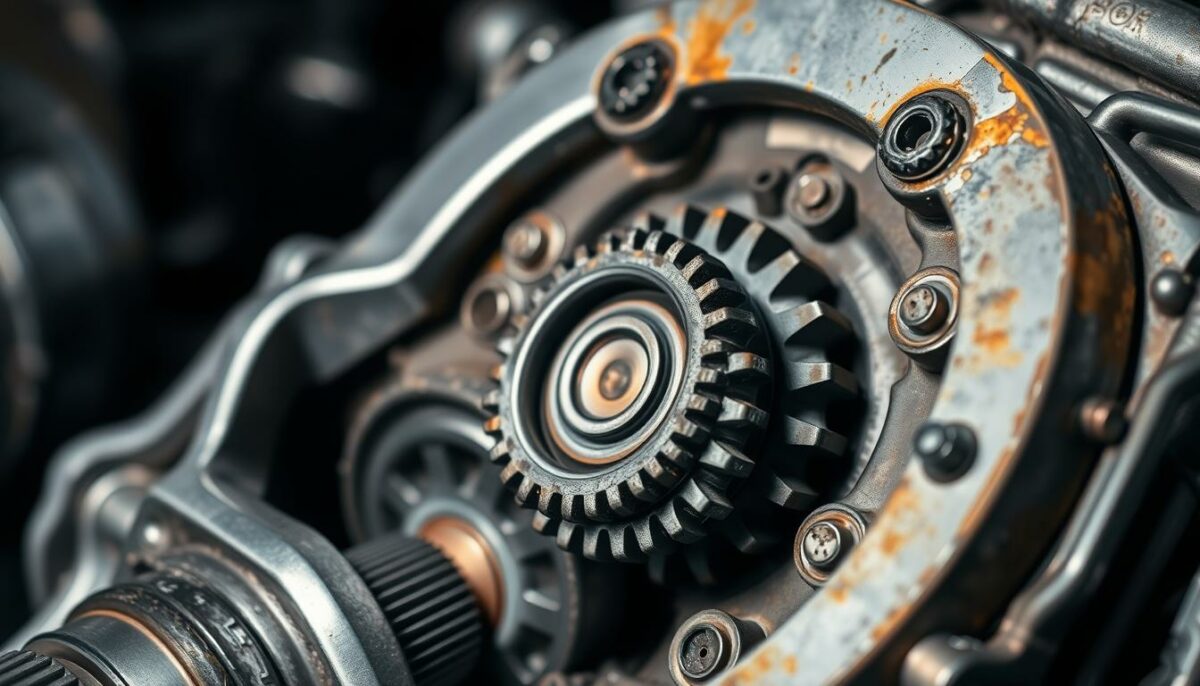
Volkswagen transmission issues arise from several key factors. Recognizing these causes helps spot early warning signs and prevent minor problems from escalating. Some issues are unavoidable, while others can be mitigated through proper care.
Wear and Tear
Mechanical components naturally degrade over time, including Volkswagen transmissions. Constant friction wears down critical parts like clutches, bearings, and synchronizers. This process accelerates as your vehicle accumulates more miles.
High-mileage Volkswagens often exhibit noticeable transmission wear. You might experience rougher shifting, unusual noises during gear changes, or delayed engagement. These signs indicate wear progressing beyond normal levels.
Certain Volkswagen models are prone to accelerated wear in specific components. Earlier DSG transmissions may show premature wear in the mechatronic unit. The dual-clutch assembly can also develop problems after extended use, especially with performance driving.
Lack of Maintenance
Neglecting regular transmission maintenance is a preventable cause of failure in Volkswagen vehicles. Transmission fluid lubricates moving parts, cools the system, and provides hydraulic pressure for shifting. When fluid deteriorates, internal components suffer accelerated wear.
Volkswagen’s DSG transmissions have specific maintenance requirements. These units need fluid and filter changes every 40,000 miles. Skipping these services can lead to contaminated fluid, reducing protection and hydraulic performance.
Regular inspections can identify problems early. Technicians can spot wear signs, check for leaks, and ensure proper fluid levels. Many transmission failures could be avoided with proper maintenance.
Software or Electrical Problems
Modern Volkswagen transmissions rely on complex electronic control systems. The Transmission Control Module (TCM) monitors sensors and adjusts shifting performance. Electrical or software issues can affect transmission operation, even with good mechanical parts.
TCM software glitches can cause erratic shifting, delayed engagement, or inappropriate gear selection. These issues might appear suddenly and sometimes resolve through Volkswagen software updates. In some cases, the entire TCM may need replacement.
Sensor failures are another common electrical issue. Inaccurate sensor readings can cause improper shifting or trigger “limp mode”. Wiring harness problems can create intermittent electrical issues that are difficult to diagnose.
Heavy Use or Harsh Driving Conditions
Your driving habits significantly impact transmission longevity. Aggressive driving places excessive stress on components, potentially leading to premature failure. Rapid acceleration, hard braking, and quick directional changes force the transmission to work harder.
Towing beyond your vehicle’s rated capacity is particularly damaging. The additional load generates excess heat and strain, deteriorating fluid and wearing down internal components. Always adhere to Volkswagen’s specified towing limits.
Environmental factors also affect transmission wear. Mountain driving and stop-and-go traffic cause more strain than highway driving. Extreme temperatures can impact performance, affecting fluid circulation and breakdown.
Understanding these causes helps Volkswagen owners protect their transmissions. Regular maintenance, moderate driving habits, and prompt attention to warning signs can significantly extend transmission life. These practices help avoid costly repairs.
Diagnosing and Fixing Transmission Problems
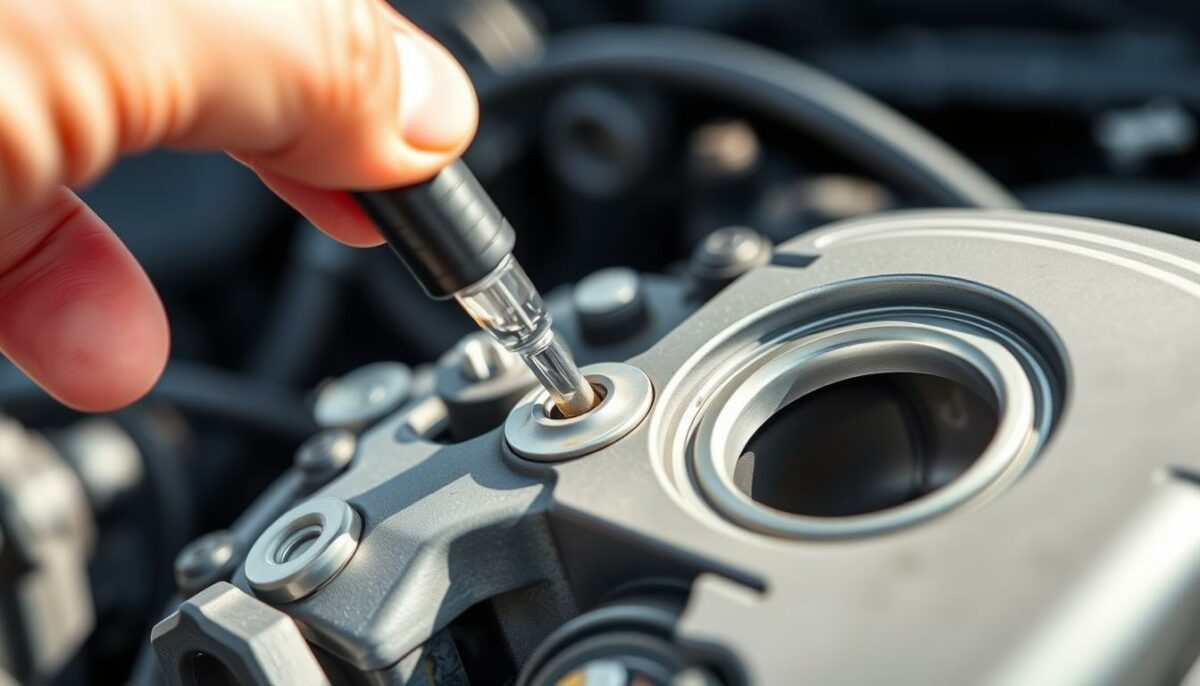
Volkswagen transmission issues require a systematic approach for accurate diagnosis. Early detection can prevent costly repairs down the line. Let’s explore methods for identifying and resolving common VW transmission problems.
Checking and Replacing Transmission Fluid
Transmission fluid is crucial for your VW’s transmission health. Regular checks can reveal early signs of trouble. Most automatic VW models require specific procedures for fluid inspection.
Check transmission fluid with the engine warm and idling. In models with dipsticks, look for clear, reddish fluid. Dark or burnt-smelling fluid indicates overheating or contamination, requiring immediate replacement.
DSG transmissions need special tools for fluid checks. These sealed systems typically require fluid changes every 40,000 miles. Always use VW-approved fluid that meets their specific standards.
Follow these steps when replacing transmission fluid:
- Locate the drain plug on the transmission pan
- Place a drain pan underneath to catch old fluid
- Remove the drain plug and allow fluid to drain completely
- Replace the drain plug with a new sealing washer
- Fill with the manufacturer-specified fluid type and quantity
Professional Diagnostics
Complex transmission issues often require professional diagnostics. Certified technicians use specialized equipment to access your VW’s transmission control module (TCM). This allows them to retrieve specific error codes for accurate problem identification.
VW-specific diagnostic tools like VCDS or factory scan tools provide comprehensive data. These systems reveal details beyond generic OBD-II scanners, including transmission temperature and clutch engagement patterns.
During professional diagnostics, technicians will:
- Perform a road test to replicate the symptoms
- Connect diagnostic equipment to retrieve error codes
- Analyze live data from transmission sensors
- Inspect mechanical components for visible damage
- Test electrical connections and solenoids
Repairing or Replacing Worn Parts
After problem identification, the next step is repairing or replacing worn components. Common replacements include clutch packs, solenoids, valve bodies, and seals.
Manual transmission clutch replacement is a frequent repair. This job requires removing the transmission and specialized tools. Costs range from $800 to $1,500, depending on your VW model.
Automatic and DSG transmissions often need mechatronic unit repairs. These control gear changes and cost $1,200 to $2,500 for replacement, including parts and labor.
| Component | DIY Difficulty | Professional Cost | Common Symptoms |
|---|---|---|---|
| Clutch Assembly | High | $800-$1,500 | Slipping, hard engagement |
| Mechatronic Unit | Very High | $1,200-$2,500 | Erratic shifting, jerking |
| Valve Body | High | $400-$900 | Delayed shifts, slipping |
| Solenoids | Medium | $300-$850 | Inconsistent shifting |
Consider your VW’s age, mileage, and condition when deciding between repair and replacement. For older, high-mileage vehicles, a complete transmission rebuild might be more cost-effective than multiple repairs.
Software Updates or TCM Replacement
Modern VW transmissions heavily rely on electronic controls. Sometimes, the issue is digital rather than mechanical. Software updates can resolve many shifting problems, especially in post-2008 DSG transmissions.
VW releases TCM software updates to address known issues and improve performance. These can fix problems like hesitation or improper gear selection without mechanical repairs.
If updates don’t help, TCM replacement might be necessary. Signs include unpredictable shifting or transmission failure. Replacement costs range from $500 to $1,200, depending on your model.
DSG transmissions require mechatronic unit adaptation after major repairs. This recalibrates the system and needs VW-specific diagnostic equipment. Always use genuine VW parts or quality OEM equivalents for transmission repairs.
Early Warning Signs That Require Attention
Addressing minor issues promptly can prevent catastrophic transmission failures. Schedule a diagnostic appointment immediately if you notice unusual noises, delayed engagement, or fluid leaks. Even seemingly minor symptoms can indicate developing problems.
Pay attention to transmission fluid condition during routine checks. Healthy transmission fluid should be clear with a reddish tint. Dark, cloudy, or burnt-smelling fluid indicates degradation and requires immediate replacement.
Finding qualified service technicians familiar with Volkswagen transmissions is essential for proper maintenance. Dealership service departments and independent shops specializing in German vehicles typically have the necessary expertise and equipment.
| Transmission Type | Fluid Change Interval | Special Maintenance Requirements | Warning Signs |
|---|---|---|---|
| Manual | 40,000-60,000 miles | Clutch adjustment, shifter mechanism lubrication | Grinding gears, difficult shifting, clutch slippage |
| Conventional Automatic | 30,000-60,000 miles | Filter replacement, pan cleaning, cooling system inspection | Delayed engagement, slipping, harsh shifts, fluid leaks |
| DSG (Direct-Shift Gearbox) | 40,000 miles | Dual fluid system service, mechatronic unit inspection | Jerky shifts, hesitation, warning lights, clutch shudder |
| Tiptronic | 30,000-60,000 miles | Solenoid inspection, valve body cleaning | Erratic shifting, failure to respond to manual inputs |
For the most accurate maintenance schedules, consult your vehicle’s owner’s manual or visit Volkswagen’s official website. Many newer Volkswagen models feature condition-based service intervals that may extend beyond traditional mileage recommendations.
Preventative maintenance is always less expensive than transmission repairs or replacements. By following these guidelines and staying attentive to your vehicle’s needs, you can maximize your Volkswagen transmission’s lifespan. This approach ensures years of trouble-free driving.
Impact of Transmission Issues on Vehicle Performance
Your VW’s transmission health affects overall vehicle performance in numerous ways. Shifting problems are obvious signs, but the effects are far-reaching. Recognizing these impacts helps prioritize transmission maintenance for optimal driving experience.
Fuel Efficiency Implications
Transmission problems can significantly increase your Volkswagen’s fuel consumption. When transmissions operate poorly, they create inefficiencies that force the engine to work harder. This results in burning more fuel during typical driving conditions.
Incorrect shift points also affect fuel efficiency. When your transmission shifts improperly, the engine operates outside its efficiency range. This issue is most noticeable in stop-and-go traffic, where optimal shifting is crucial.
Long-term Vehicle Reliability
Transmission health directly impacts your Volkswagen’s longevity. Modern VWs have integrated powertrain systems where transmission function links with other critical components. Persistent transmission issues can create a domino effect of problems throughout the vehicle.
Well-maintained transmissions increase a vehicle’s chances of reaching 200,000 miles without major repairs by 60%. This difference underscores how crucial transmission care is for overall vehicle durability.
Resale Value Considerations
Your VW’s transmission condition significantly impacts its market value when selling or trading. Vehicles with documented transmission issues typically see a 15-25% reduction in resale value. Buyers often scrutinize transmission health during pre-purchase inspections.
Transmission replacements can cost between $3,000 and $7,000 for most Volkswagen models. Regular maintenance records can increase your vehicle’s value by up to 10%. For DSG-equipped VWs, proof of the 40,000-mile service is particularly valuable.
Cars with transmission issues usually take 2-3 times longer to sell. This extended market time further reduces their value through increased selling costs and depreciation. Proper transmission care preserves your Volkswagen’s performance, efficiency, reliability, and value.
FAQs
How often should I service my VW transmission?
VW automatic transmissions typically need service every 40,000 to 60,000 miles. DSG transmissions require fluid and filter changes at 40,000-mile intervals. Manual transmission fluid can last 60,000 to 80,000 miles in Volkswagen vehicles.
Harsh driving conditions may shorten these intervals. Check your owner’s manual for specific recommendations tailored to your model.
What are the signs of a failing manual transmission?
Grinding noises when shifting gears often indicate VW manual transmission problems. Watch for gears slipping or difficulty engaging. A burning smell might signal overheating transmission fluid.
Strange vibrations or delayed shifting responses are warning signs. These symptoms suggest worn parts or clutch issues that need attention.
Can I drive with a transmission fluid leak?
Driving with small transmission fluid leaks risks serious damage to your VW. Red or brown spots under your car indicate a leak needing immediate attention.
Low fluid levels can cause overheating and poor shifting. Fixing a small leak costs less than replacing an entire transmission. Seek mechanic help promptly if you spot leaks.
What does the transmission warning light indicate?
A transmission warning light on your VW dashboard signals potential system problems. It may indicate overheating, low fluid levels, or electronic control issues.
Some models flash “PRNDS” for DSG transmission problems. If this light appears, reduce speed and avoid aggressive driving. Get your vehicle scanned for diagnostic codes to identify issues quickly.

